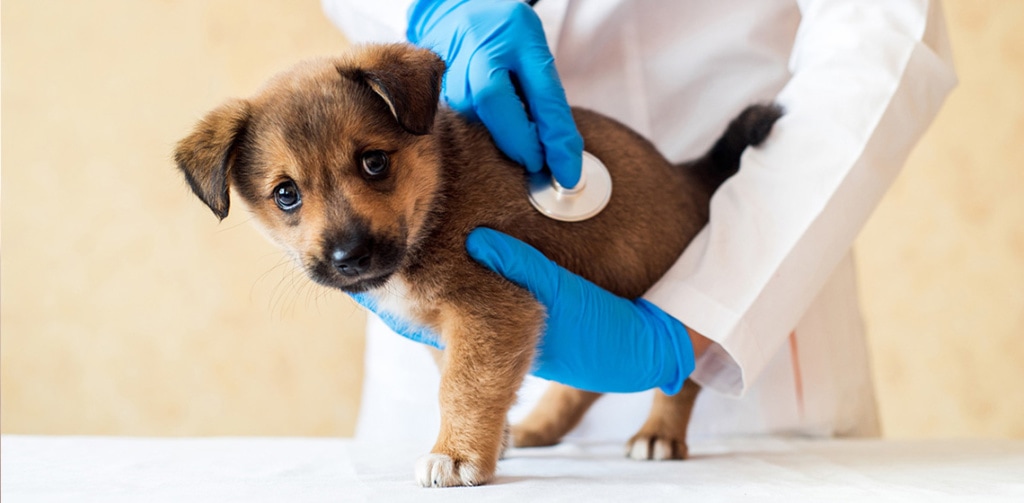When you take home a new puppy, you’ll naturally have done your research. With worming and flea treatments, home preparation, and basic training, it can seem like there’s a lot to think about! But what about puppy vaccinations? When it comes to puppy shots, the information seems to get even more complicated and confusing. So, what shots do puppies need?
What are puppy shots?
Puppy shots, or puppy vaccinations, are injections that your puppy needs to have early on in their life. These vaccinations protect them against common diseases, some of which can be fatal. To keep your little loved one safe, they will need booster vaccinations every year of their life.
Why does my puppy need to have shots?
When a puppy is born, they receive some protection against diseases from their mother’s milk. However, this protection subsides over time, leaving them vulnerable to illness. Puppy shots are vaccinations that maintain your pup’s immunity against serious and even life-threatening diseases. In some cases, the vaccine will prevent the disease altogether. In others, it will reduce symptoms and, therefore, minimize spread. So, as well as keeping your pup healthy, vaccinations help keep infection levels down in the dog population.
At eight weeks, puppies receive shots against Distemper, Adenovirus, Parvovirus, and Parainfluenza. They can also have the Bordetella (kennel cough) vaccine at this age.
What diseases do the shots protect my puppy against?
Like many other countries worldwide, puppies are vaccinated against the core diseases listed below in the US. However, in addition to these core diseases, puppies in the US need some extra cover.
Core diseases
Canine Distemper Virus
Distemper is a serious viral disease that is especially common in young dogs. It causes various symptoms, including vomiting, diarrhea, fever, seizures, breathing problems, and hyperkeratosis of the nails and footpads. However, some dogs don’t show any signs at all. Although dogs can recover from Canine Distemper, they are often left with lifelong health issues.
Canine Adenovirus
There are two types of Canine Adenovirus. Type 1 causes infectious hepatitis and a severe form of kennel cough, which can be fatal in puppies and other vulnerable dogs. Type 2 is only associated with kennel cough. Thankfully, by vaccinating against just one type of adenovirus, there is cross-protection for both.
Parvovirus
Parvovirus is a common cause of severe gastroenteritis. It spreads quickly between unvaccinated dogs and is commonly fatal. Parvovirus symptoms start as vomiting and foul-smelling diarrhea, and soon the guts become badly damaged. Once the intestines are damaged, the diarrhea becomes an unpleasant mix of blood and lining from the diseased guts. Affected dogs often become dehydrated despite intense supportive treatment, and although some recover, sadly, for many, it is fatal.
Parainfluenza
Parainfluenza virus is one of the causes of kennel cough. Also known as infectious tracheobronchitis, multiple viruses and bacteria can cause kennel cough. If your dog has kennel cough, you’ll probably notice a hacking cough as if they are trying to bring something up. It’s pretty common for dogs with kennel cough to retch or vomit during coughing fits. Kennel cough gets its name from being so contagious and its ability to spread quickly through environments like kennels.
Leptospirosis
Leptospirosis is a disease caused by Leptospira bacteria. It is commonly spread in rats’ urine and is the doggy version of Weil’s disease in humans. Any dog who comes into contact with fresh water like ponds, rivers, streams, lakes, or boggy ground could be at risk of contracting Leptospirosis. Leptospirosis causes liver and kidney failure as well as vomiting and diarrhea. Although it can sometimes be treated with medication, it is often fatal.
After your puppy’s first course of shots, they will need annual vaccinations to boost their immunity and keep them protected.
Additional vaccinations
Bordetella
Bordetella bronchiseptica is a bacteria that is one of the causes of kennel cough, just like Canine Adenovirus and Parainfluenza virus. The Bordetella vaccination is typically given as a nasal spray rather than a shot.
Rabies
Rabies is one of the deadliest viral diseases, both for dogs and humans. The virus is spread through the saliva of infected animals, so a bite from an infected dog can cause human infection. Other animals can also be infected with Rabies, and bats are responsible for most human cases. Thankfully, Rabies is now very rare, likely due to the vaccination of both pet animals and humans.
Canine Influenza Virus
Canine Influenza, or flu, is a relatively new virus. It is thought to have originated as a horse flu virus, which adapted to infect dogs. The first noted case was in Florida in 2004, and since then, vaccination against canine flu has been recommended. Similar to flu in people, canine flu causes coughing, sneezing, and fever.
Lyme disease
Lyme disease is a bacterial tick-borne infection, and it spreads via tick bites. In another article, we also wrote about the challenges of removing a tick from your dog. Both humans and animals can develop Lyme disease. There is often a trademark “bullseye” lesion on the skin where the bite has occurred. Lyme disease causes polyarthritis, which causes the joints to become swollen and painful. This leads to stiffness and lameness, and affected dogs may also have a fever and enlarged lymph glands.
When does my puppy need to have shots?
Your exact location, the brand of vaccination used, and your veterinary clinic’s vaccine protocol will all have an impact on the precise dates of your puppy’s shots. However, vaccination against Distemper, Adenovirus, Parvovirus, and Parainfluenza is usually given at eight weeks old, alongside an intranasal Bordetella vaccination. This first shot is repeated at 12 weeks and 16 weeks, but with the additional Leptospirosis vaccine. The Rabies vaccination is also given at 16 weeks, and additional vaccines like flu and Lyme disease will follow that.
After your puppy’s first course of shots, they will need annual vaccinations to boost their immunity and keep them protected.
What about side effects?
Any medication, no matter how routine, has the potential to cause side effects. This is partly because your puppy’s body can detect any foreign substance and mount a reaction to it. Vaccine reactions can range from a true anaphylactic reaction to a few days of feeling off-color. Thankfully, anaphylactic reactions are very rare. When giving any medication or preventative health care to your pet, it’s essential to recognize the risks and benefits. A member of our veterinary team will be able to discuss any concerns that you have, as well as helping you understand the more significant risks of not vaccinating your puppy.
FAQ
What shots do puppies need in the first year?
In their first year, puppies need a primary course of vaccines against Distemper, Adenovirus, Parvovirus, Parainfluenza, and Leptospirosis. They will also need a single dose of the Rabies and Bordetella vaccines. In most states in the US, Lyme disease and Canine Influenza vaccines are also recommended.
How much does it cost for puppies’ first shots and deworming?
The core vaccines for puppies tend to cost around $75 to $100. However, additional vaccines against Rabies, Lyme Disease, and Canine Influenza would be charged separately, at approximately $20 to $45 per vaccine. Your veterinary clinic may offer a care package that can help spread the cost of their care, including vaccines, deworming, and examinations.
What shots do puppies get at 8 weeks?
At eight weeks, puppies receive shots against Distemper, Adenovirus, Parvovirus, and Parainfluenza. They can also have the Bordetella (kennel cough) vaccine at this age.
Summary
Taking care of your new fur baby can seem daunting, especially when it comes to keeping up with their preventative healthcare. The table below should help you understand what shots your puppy needs and when so that you can focus on enjoying life with your new puppy!

Dr. Hannah Godfrey MRCVS graduated from the Royal Veterinary College in 2011. Although she initially worked in mixed practice treating all species, she found a love for small animal work and has worked exclusively with dogs and cats since 2014. She lives in Wales with her partner, son, and two cats (named Poppy and Ashton Kutcher), and writes comedy fiction in her spare time.









